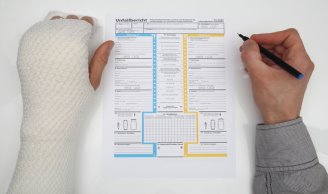Practice Areas / Workers Compensation
Worker’s Compensation Claims

If you’ve been injured or have fallen ill while at work, or on the job at a remote site, you may want to file for worker’s compensation in order to pay for your medical care costs. Worker’s compensation claims can also cover rehabilitation and sometimes cover lost wages if you’ve had to miss work due to your injuries.
In order to get these benefits, you’ll want to contact an experienced lawyer who can assess your situation and help you follow your state’s specific requirements.
How to file a claim
Because you must inform your employer of your injury as soon as possible, before filing a claim you will want to make sure to see a doctor immediately. Many states have a limit on the number of days you can go before notifying your employer. And, your employer will want to know if you’re getting medical care for your injury. In fact, seeking medical treatment and following the advice of your doctor is necessary to win your claim and receive compensation.
In many states, your employer may have worker’s compensation insurance and will be likely to cooperate with you. They’ll have you fill out some forms to notify their insurance. In most cases it is your employer’s responsibility to submit these claim forms to their insurance company. Sometimes, however, you must submit the forms, so be sure to check with your local state laws.
If for some reason your employer won’t cooperate with you and gives you a hard time, you can always call your local worker’s compensation office for help. And, if that doesn’t work, you can consult a qualified attorney to communicate with your employer for you.
What to do when your employer does not cooperate with you
Just like any other type of insurance, when a claim is submitted by someone, their rates go up. For this reason, your employer might fight you on your claim in order to keep their rates low. But there is a way to protect yourself from this possibility. Document everything.
Keep detailed records
To make your worker’s compensation claims case smooth, you’ll want to keep detailed records of everything as it happens. This includes details about when your injury occurred, who witnessed it, witness statements, and any conversations you had with your supervisor about your injury. Be sure to include full names, dates and times to the best of your ability.
What you can get from a worker’s compensation claim
Sometimes an injury is permanent, and you will be entitled to a larger sum of money including the payment of all medical bills, rehabilitation as well as lost wages if you are no longer able to work. However, when an injury is not permanent and doesn’t cause you to lose your income, you might only end up with your medical bills paid. Considering how high medical bills are, it is worth pursuing if you have a case.
Worker’s compensation claims are nothing to be feared, although it may seem intimidating and stressful at first. If you’re unsure about whether or not you have a valid claim, contact an experienced attorney to go over your situation with you and they will help you on your path to getting back on your feet.


